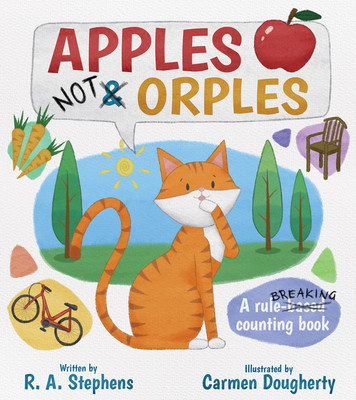Author Interview — BRINGING MATH CONCEPTS TO LIFE: Rochelle Stephens
Novel Insight on 29th Oct 2024
Teacher and author Rochelle Stephens talks about her journey to create Apples Not Orples and how playful stories can help children connect with math concepts.
What do you enjoy about writing children's books?
I like sharing what I know or what I have learnt along the way in life with kids. I am a teacher in my day job and publish children's books on the side, so I guess I just like inspiring and creating interest!
What inspired you to write Apples Not Orples?
I am a maths teacher who constantly explains to students why they cannot mix letters to make new numbers in addition. Maths addition follows very specific rules and you can only add “like” items to another. For example, when teaching students in junior secondary, I would say that if you have 'x + y' they are two different things, so it doesn’t make 'xy'. That’s like saying there is an apple and an orange, and when you add them together you get one 'appleorange'. You can’t mix it and make something new like that in maths. You can only group and add things that are the same.
Apples are just apples and oranges are just oranges. They are not orples.
I decided to play with the words a bit to help interact with children of all ages.
You love to mix science and maths with children's fiction. What inspired this?
I think there is value in writing what you know. It makes sense right? When you write a story, it's much harder to write something about a topic you don't know. When I do it, I have to do more research and of course, it just comes naturally to talk about what I do know and like. I love how maths goes together. It is just perfect the way it is! For interest, 6 and 28 are perfect numbers! ;) Plus a few more...
How did the writing process for this book compare to your previous books?
It seems like there is not much to it—Kirkus reviews have called it a Mathematical morsel. But writing and making sense takes work, whether it is for one word or many. It was also fun to make up the silly words, even if—of course—they are kind of breaking the maths rules!
What was it like to tackle an often difficult subject, like algebra, for such a young audience?
Well, I guess in many ways I thought this book might be able to be used in schools even with older kids. I am always saying, "You can't add things that aren't the same" as they don't become something else. So if kids could get the concept at a young age then maybe it would be a bit easier. A teacher colleague of mine said she could imagine using it with Grade 7 kids. I see it as a fun bit of excitement and amusement for little kids in learning, but a bit more of a message that could be dipped into again. Like when a child tries algebra it is easy to say, "Don't forget apples don't become orples because you can't mix them".
What do you hope your readers will take away from Apples Not Orples?
Some fun and a tiny bit they might remember later for maths. And perhaps the teachers and parents can have a bit of a handy tool for maths.
What was it like to work with an illustrator on this story?
We kept changing things all the time. You can get a glimpse of the process in this quote by the illustrator.
"One thing that I’ve found most people can relate to is that moment when someone finally explains a concept in just the right way that it makes you go: AH HA! NOW I’VE GOT IT! That’s what it was like making the drawings for this book. I went through many draft ideas before finally settling on the narrator cat and his animal friends. The idea really came to life when I got the idea for the monkey scene. Rochelle and I were discussing the book, and she told me how much fun she was having coming up with the various name combos. I cheekily thought, I bet I can include this in the book somehow. And, what better way than a giggling troupe of monkeys? My favourite part of the book was the Noooo’s. Once I had settled on the idea of including various animals in each scene, I knew it would be funny to have them interact with the cat in ways that mimicked the nature of each animal in real life. This was what helped me to come up with the little jokes like the dog startling the cat; the koala and the cat discussing the confusing chable; and the overexcited rabbit sneaking up on the cat. It was a challenging process, coming up with interesting pictures for this book, but I very much enjoyed it." — Carmen Dougherty
Do you have any other projects in the works?
I have a picture book coming out in April 2025—just in time for Mother's Day—called My Mother's Invisible Shield. It is written from my experience as a mum who has a child investigating how the mum always knows when he is coming or up to something. He tests her invisible shield to work out (of course a little scientifically) what power his mum has.

